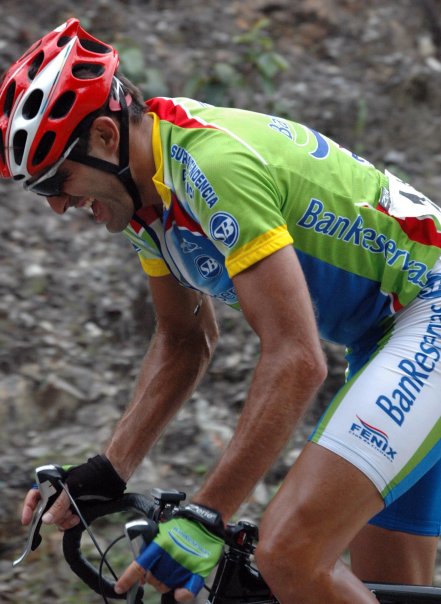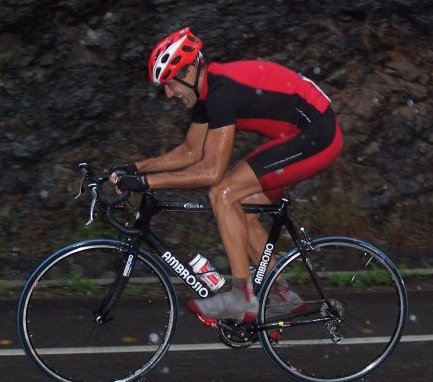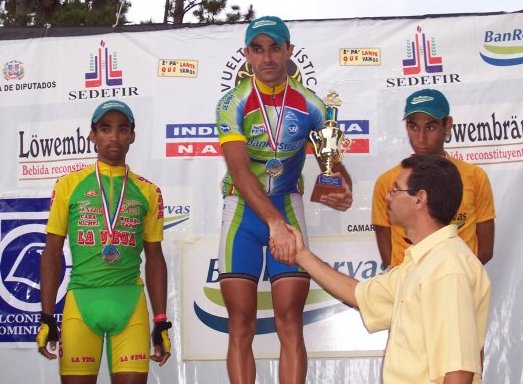“Do you remember the James Cambridge boy we were talking to at that kermis in Sersekamp, four or five years ago?” says Viktor.
“Red Specialized, great tan, pro’s legs and a cool Craft undervest?” I reply.
“That’s him; he was top ten in the Rutland race, last weekend — he’d be a good boy to talk to.”

Why did you go to Belgium, James?
“I first went as a junior, on a Graham Baxter training camp.
“When I was there, I met Alan Peiper and he invited me to stay with him; then a family took me in.”
How many seasons?
“I was there for seven seasons, I stayed in Ninove, near where the Tour of Flanders finishes.
“I only came back to England once during the season in that time — I damaged my back and had to come home to get it sorted out.”
What was your best year?
“In 1998 I had six wins; five kermesses and an Inter Club, a hilly one at Flobecq.”
Was that Inter Club your best result?
“I’d say my best result was the same year, in a pro kermesse; which I could ride on my Belgian licence — at Afflegem.
“I was seventh behind Nico Eeckhout in the pouring rain.
“It was the fastest kermesse of the year — 48 kph and I finished with a huge bubble on my tyre after one of the team cars ran into my back wheel.
“There were eight of us away, but I was loosing ground on every corner because of my tyre.”
Did you get pro teams ‘sniffing?’
“I had talks with teams; in ’99 I came home for the Nationals and was talking to Sean Yates about McCartney; but that in the end they decided to go for ‘bigger’ riders (none of whom ever got paid!)
“Flanders were interested too because I had UCI points, but if you joined a Belgian team, you usually had to take your own sponsor (a rich relative or businessman friend) who’d pay your wages.
“At that time, you had to find about 6,000 euros — which is what you would get paid, plus prizes.
“There was also a situation where, if a Belgian team took on a young Belgian who was unemployed — and most of them who raced were full time on the bike — then the Government would pay half of their wages.
“If you weren’t Belgian it was difficult to get round that; as I recall, only Roger Hammond managed to get a contract around that time — and that was more for his ‘cross abilities.”

Do you speak Flemish?
“A little bit, not great, I lived with a family for two-and-a-half years, part of the Planckaert clan.
Who were the big hitters, then?
“There were four or five guys; Patrick Chevalier springs to mind, they were in the mafia; it took a couple of years, but eventually I got in with them and made some good ‘arrangements.’
“But some days I got tired of all that that I would say; “let’s just race, today!”
Why did you call a halt?
“I was still keen; but maybe I was tired of giving it my best shot every year and seeing guys who I was better than, getting pro contracts because they had rich uncles.
“Thinking back, I should have spent three years in Belgium, moved to Spain, then Italy — but I liked Belgium and just kept going back.”
What do you miss about Belgium?
“It wasn’t easy racing, but it was easy to race; in ’99 I rode nearly 100 races and I didn’t chuck many.
“I think I had 47 top tens that year; there were guys who’d start three races each week, but not finish any of them — I wasn’t like that.
“I was always winning money; my apartment was provided by the club and I split expenses with my mate, Paul Wilkes — we were friends since juniors, he was out there with me in ’98 and ’99.”
When we spoke to you at Sersekamp, you told us about a Venezuelan connection?
“It was the Dominican Republic, actually; I met my wife there.
“An insurance company out there wanted some European riders to come out and train with the Dominican squad to prepare them for their national tour — the insurance company was sponsoring the team.
“I got the job; I coached them and advised them on race tactics and how to ride as a team, not a collection of individuals.
“They had coaches out there, Cubans, but it was all old Soviet style stuff.
“I had two months out there each winter, coaching, racing myself and staying in a five star hotel; even when I stopped riding in Belgium.”
[What James didn’t tell us was that he picked up four stage wins in the Vuelta a la Independencia Nacional between 2002 and 2006 – Ed.]
But your home in the UK, now?
“Yeah, I work here, have done for a couple of years, I service fire alarms.
“I’m self employed, so I take a Wednesday off and got out with the students from Loughborough University on a long fun.”
Top ten in the Rutland isn’t a bad result.
“I rode the bike though the winter and was in reasonable shape, so I approached the organiser, Colin Clews and he sorted me out with a ride.
“Once my name was down, I got keen and rode some hilly TT’s and road races to get ready for it.
“I crashed on the first lap and bent my ‘bars, but I bent them back and just carried on.”

Will we be seeing more of you in UK racing?
“I’m quite fit, I did a little two day stage race there and was 9th overall with 5th on a stage.
“I do it for enjoyment, it keeps me fit and there’s not the pressure to perform at the level I’m racing at.”
Are you little jealous of the WCPP set up?
“Christ, yeah!
“I help Gary Coltman with the Talent Team, that’s for the kids, but back then we did it all off our own backs.
“I wouldn’t say that the kids are spoiled, but they have no worries outside of cycling.
“Maybe they could be a little tougher; a thing I don’t like is the race radios, they should be thinking for themselves.”
Regrets?
“Everything I did I thought was best for me at the time, but it was a different era and you were racing against a lot of guys who were kitted up.
“I’m jealous of guys entering the sport now because it’s cleaner than it’s ever been – but you can’t ask to born ten years later, can you?”
File under ‘unsung heroes,’ say ‘hello’ to the man if you bump into him at a race — he was the real deal; living and winning in the toughest school of them all.
Thanks to James for his time, and wishing him all the best for the rest of the season.



